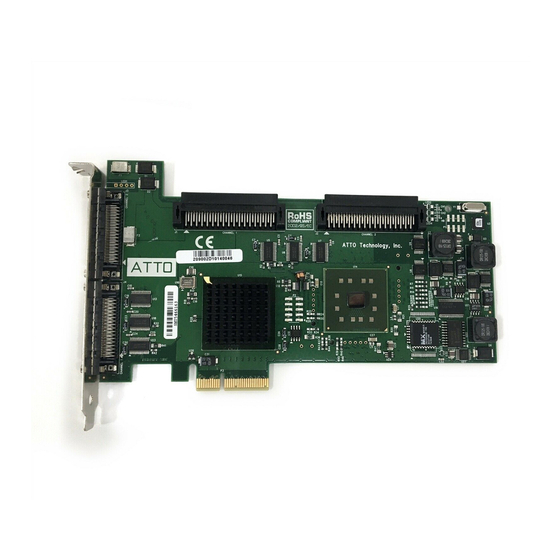ATTO Technology UL4D PCI 문제 해결 매뉴얼 - 페이지 6
{카테고리_이름} ATTO Technology UL4D PCI에 대한 문제 해결 매뉴얼을 온라인으로 검색하거나 PDF를 다운로드하세요. ATTO Technology UL4D PCI 12 페이지. Atto technology ul5d lp host adapters: supplementary guide
ATTO Technology UL4D PCI에 대해서도 마찬가지입니다: 호환성 차트 (1 페이지), 보충 설명서 (8 페이지)

The SCSI host adapter fails its Power On Self Test.
The BIOS driver will perform several checks to verify that the host adapter is
functioning. If the BIOS driver determines that the adapter has non-functioning
hardware it will not complete the initialization of the OS driver. If the BIOS driver
determines that the firmware on the adapter is not functioning, then it will
complete the initialization in degraded mode. Under Windows, degraded mode
will not perform I/O but it will allow the end user to flash the adapter with working
FW. The POST failure will be recorded in the Windows Event Log. Try to re-
flash the firmware using the Configuration Tool in Windows. If the problem
persists, replace the host adapter.
The software application being used to communicate with the attached SCSI
devices reports Parity or communication errors.
Check your cables. There could be slight damage to one conductor causing
intermittent failures. U320 SCSI requires high quality cables that are specifically
rated for the U320 transmission speeds.
Try slowing down the data transmission rate by lowering the sync rate for the
drive in question. To do this, launch the ATTO Configuration Tool. Double click
on the drive you want to change. The current sync rate will be displayed. Lower it
then close and save the changes. Reboot. You can also modify the sync rates by
entering the Control-Z SCSI setup program during boot. If this resolves the
issue, the SCSI device may need to be replaced.
If the issue is not resolved, enable the Event logs as described below and
contact ATTO Technical Support.
Errors are reported while using the ATTO Configuration Tool.
Note: Sometimes when using the ATTO Configuration Tool, an error message
describing an unexpected event or incorrect information discovered by the
application will be displayed.
Use the help text presented with the error message to correct the issue.
The following conditions cause a warning or error message to be posted in the
"Status" area of the configuration utility. These messages will be shown in red.
o An error occurred loading NVRAM data - The first time a host adapter
channel is highlighted, the application makes an attempt to read NVRAM
from the card. If the size of the NVRAM buffer does not match the expected
size, or if the NVRAM buffer couldn't be retrieved at all, this message is
displayed.
o Warning: NVRAM could not be read, defaults returned - This message occurs
as a result of corrupt NVRAM. When the driver accesses the NVRAM, a
continuity check is performed on the NVRAM to ensure the returned data is
valid. If this check fails, the driver has no other alternative than to return a
known NVRAM data buffer that represents card defaults. When this situation
occurs the defaults are presented via the graphical user interface and the
Page 6 of 12
Atto Technology, Inc.
January 19, 2007
